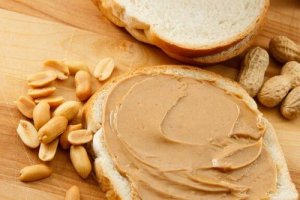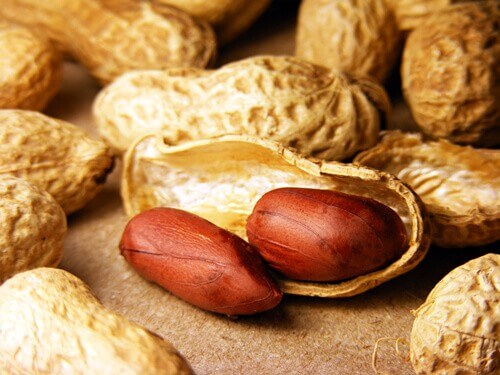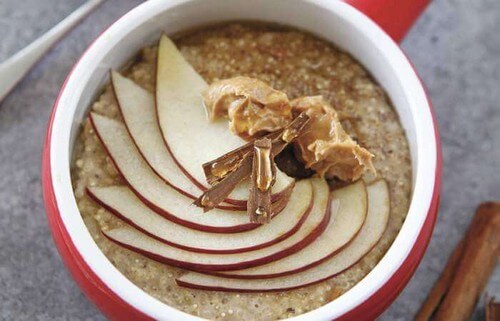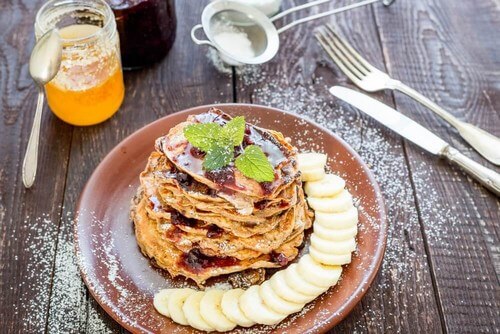How Peanut Butter Is a Sports Superfood

Indeed, peanut butter is a sports superfood, but what makes us say that? If you haven’t made it a part of your diet, we’ll give you the reasons why you should start.
Firstly, we’ll take a look at its nutritional values to get a detailed view of what it has to offer. Then, we’ll go over why peanut butter is a sports superfood and why it’s so great for athletes. Finally, we’ll suggest different ways to add it to your diet so you don’t become bored with always eating toast.
Nutritional values of peanut butter as a sports superfood
The best way to become acquainted with any food is to look at its nutritional values. In this case, it’ll give you a chance to see how peanut butter is a sports superfood. You’ll be amazed by the data since this product seems to be made for athletes.
One hundred grams of peanut butter has a whopping 610 calories. What’s more, every 100 grams are packed with 31 grams of protein. This is a very high amount that’s comparable to veal or chicken breast.
Peanut butter also contains 7 percent fiber and 47 percent fat, much of this is very healthy for athletes. Further, it contains minerals such as 74 mg of calcium and 180 mg of magnesium.
As you can see, it’s important to go beyond how many calories foods contain. What’s really important is what’s behind those calories. In this case, peanut butter can be a great source of energy for athletes and can help them to get the most out of their training.
Read more about: Functional Foods and Dietary Fiber for a Longer Life

How peanut butter is a sports superfood
Athletes often eat peanut butter due to its high caloric content. It’s a completely natural and healthy way to boost your body’s energy so it can perform at its best during exercise.
What’s more, peanut butter contains healthy fat and protein. This is exactly what athletes need to reach their goals.
Peanut butter can help to improve cardiovascular health, regulate blood sugar levels, and slow down cellular aging.
As such, it’s a sports superfood that you shouldn’t miss out on. In the next section, we’ll explore ways to eat it to avoid becoming bored with it.
Find out more: Tips to Increase Your Energy and Vitality
Ways to eat peanut butter
Now that you know more about the amazing properties of peanut butter, you might be wondering how you can include it in your diet? Take a look at these three ideas; they’re all healthy and easy to make.
1. Peanut butter with bread
Indeed, this is the most common way to eat peanut butter. Choose quality bread so that you can also benefit from its properties. You can also toast the bread for a crunchier texture. Then, simply, spread a thin layer of peanut butter over it.
What’s more, eating it while drinking coffee and a splash of milk will turn it into a hearty breakfast. It’ll definitely sustain you for a while.

2. Porridge with peanut butter
Until a few years ago, porridge wasn’t very popular. Today, it’s a regular breakfast for many athletes. The most common way to make it is by boiling milk or water with oats (oatmeal). The end result is a thick and filling mixture.
You can eat it with chopped fruits or peanut butter. Just add a couple of tablespoons once you’ve finished preparing the porridge. On top of enjoying all of its properties, you’ll have a great tasting meal.

3. Pancakes with peanut butter
Pancakes are another way you can enjoy peanut butter. In just five minutes, you can make healthy and delicious pancakes. If you’re not familiar with the recipe, here’s an easy way to go about it.
Once your pancakes are ready, just spread peanut butter over them as you would with toast. You’ll have a nutritious and satisfying breakfast providing you with energy for the whole day.
How peanut butter is a sports superfood: conclusion
In conclusion, peanut butter is a sports superfood. It’s easy to add to every-day meals and it’s very nourishing. Have you had a chance to try it?
Indeed, peanut butter is a sports superfood, but what makes us say that? If you haven’t made it a part of your diet, we’ll give you the reasons why you should start.
Firstly, we’ll take a look at its nutritional values to get a detailed view of what it has to offer. Then, we’ll go over why peanut butter is a sports superfood and why it’s so great for athletes. Finally, we’ll suggest different ways to add it to your diet so you don’t become bored with always eating toast.
Nutritional values of peanut butter as a sports superfood
The best way to become acquainted with any food is to look at its nutritional values. In this case, it’ll give you a chance to see how peanut butter is a sports superfood. You’ll be amazed by the data since this product seems to be made for athletes.
One hundred grams of peanut butter has a whopping 610 calories. What’s more, every 100 grams are packed with 31 grams of protein. This is a very high amount that’s comparable to veal or chicken breast.
Peanut butter also contains 7 percent fiber and 47 percent fat, much of this is very healthy for athletes. Further, it contains minerals such as 74 mg of calcium and 180 mg of magnesium.
As you can see, it’s important to go beyond how many calories foods contain. What’s really important is what’s behind those calories. In this case, peanut butter can be a great source of energy for athletes and can help them to get the most out of their training.
Read more about: Functional Foods and Dietary Fiber for a Longer Life

How peanut butter is a sports superfood
Athletes often eat peanut butter due to its high caloric content. It’s a completely natural and healthy way to boost your body’s energy so it can perform at its best during exercise.
What’s more, peanut butter contains healthy fat and protein. This is exactly what athletes need to reach their goals.
Peanut butter can help to improve cardiovascular health, regulate blood sugar levels, and slow down cellular aging.
As such, it’s a sports superfood that you shouldn’t miss out on. In the next section, we’ll explore ways to eat it to avoid becoming bored with it.
Find out more: Tips to Increase Your Energy and Vitality
Ways to eat peanut butter
Now that you know more about the amazing properties of peanut butter, you might be wondering how you can include it in your diet? Take a look at these three ideas; they’re all healthy and easy to make.
1. Peanut butter with bread
Indeed, this is the most common way to eat peanut butter. Choose quality bread so that you can also benefit from its properties. You can also toast the bread for a crunchier texture. Then, simply, spread a thin layer of peanut butter over it.
What’s more, eating it while drinking coffee and a splash of milk will turn it into a hearty breakfast. It’ll definitely sustain you for a while.

2. Porridge with peanut butter
Until a few years ago, porridge wasn’t very popular. Today, it’s a regular breakfast for many athletes. The most common way to make it is by boiling milk or water with oats (oatmeal). The end result is a thick and filling mixture.
You can eat it with chopped fruits or peanut butter. Just add a couple of tablespoons once you’ve finished preparing the porridge. On top of enjoying all of its properties, you’ll have a great tasting meal.

3. Pancakes with peanut butter
Pancakes are another way you can enjoy peanut butter. In just five minutes, you can make healthy and delicious pancakes. If you’re not familiar with the recipe, here’s an easy way to go about it.
Once your pancakes are ready, just spread peanut butter over them as you would with toast. You’ll have a nutritious and satisfying breakfast providing you with energy for the whole day.
How peanut butter is a sports superfood: conclusion
In conclusion, peanut butter is a sports superfood. It’s easy to add to every-day meals and it’s very nourishing. Have you had a chance to try it?
All cited sources were thoroughly reviewed by our team to ensure their quality, reliability, currency, and validity. The bibliography of this article was considered reliable and of academic or scientific accuracy.
- Bourke, L. (2010). Alimentos y suplementos para deportistas. In Nutrición en el deporte. Un enfoque práctico.
- del Castillo, V. (1995). La alimentación del deportista. In Salud, Ejercicio Físico y Deporte.
This text is provided for informational purposes only and does not replace consultation with a professional. If in doubt, consult your specialist.








